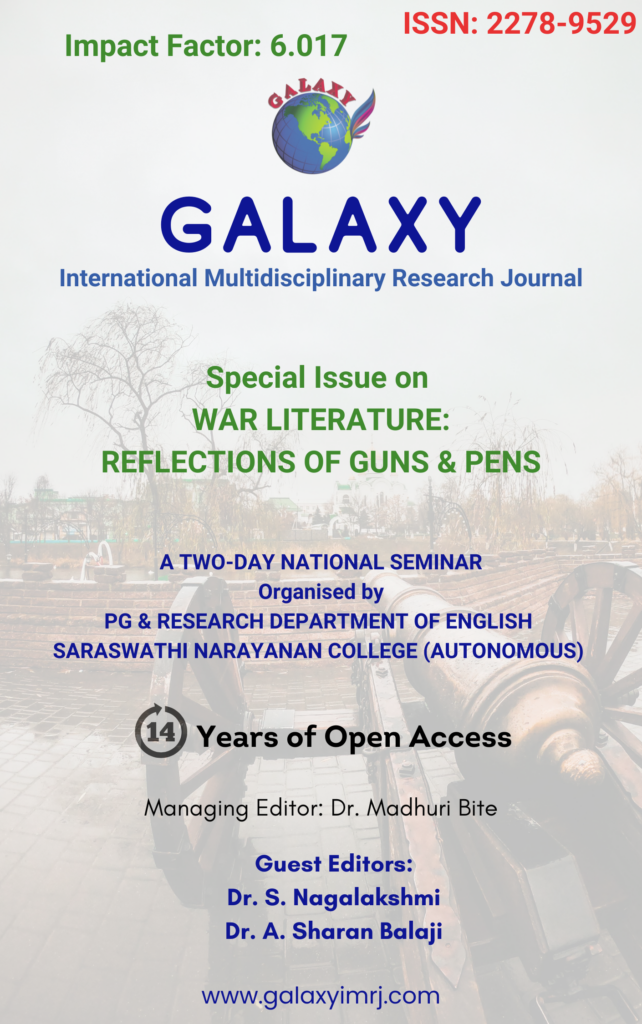CONTENTS
| Sr. No. | Author | Title of the Paper | Pg. No. | |
| 01 | A. Rajkapoor & Dr. A. Abdul Hakeem | Psychological Trauma in Orhan Pamuk’s Snow and Khushwant Singh’s Train to Pakistan | 01-08 | |
| 02 | Dr S Bhuvanesh | Exploring the Journey of Women in Amrita Pritam’s Pinjar | 09-17 | |
| 03 | Kavitha. J & Dr. D. S. Parveen Banu | The Battle of Kohima in Naga Literature: A Study of Mari | 18-25 | |
| 04 | Jessy Mathew | Feministic Approach to Gender Identity in War: A Study Based on Helen Benedict’s Sand Queen | 26-36 | |
| 05 | M. Nivetha | Thematic Study of War and Love in Mitra Phukan’s The Collector’s Wife | 37-44 | |
| 06 | Dr. A. Malika Begum | Transgenerational Trauma: Maternal Legacies in Sorayya Khan’s Noor | 45-52 | |
| 07 | Dr. M. Rajavignesh | Shadows of Partition: Historical Trauma and the Illusion of Boundaries in Amitav Ghosh’s The Shadow Lines | 53-61 | |
| 08 | Sharmila. D | The Human Side of the Uniform: Rachna Bisht Rawat’s Portrayal of Military Life | 62-69 | |
| 09 | D. Muneeswaran | A Tale of a Rebellion Hero: Tirot Sing | 70-79 | |
| 10 | Dr. B. Kavikashree | The Trauma of Displacement: War and Identity in Amitav Ghosh’s The Glass Palace | 80-87 | |
| 11 | P. Eswari & Dr. V. Subathra Devi | “No Victor, No Vanquished” Rhetorical Analysis of Historical and Political Dimension of Biafra Civil War Scar | 88-93 | |
| 12 | Nayan Tara | Unveiling the Horrors of Past: A Study of Memory, Trauma and Fragmented Narrative in Sebastian Faulks’ Birdsong | 94-101 | |
| 13 | Dr. D. Soundarapandi | A Historian’s Perspective: Decoding the Secret War in Roger Warner’s Shooting at the Moon: The Story of America’s Clandestine War in Laos | 102-109 | |
| 14 | Dr. P. Ilayaraja | Social Trauma in Indira Goswami’s The Moth-Eaten Howdah of the Tusker | 110-117 | |
| 15 | Sabitha. S & Dr. Nagalakshmi. S | Healing the Scars of War: A Study of the Psychological Toll of War in Jodi Picoult’s The Storyteller | 118-124 | |
| 16 | R. Saranraj | Depiction of Indian Soldiers in Mulk Raj Anand’s Across the Black Waters | 125-132 | |
| 17 | Dr. D. Geetha | Coloring the Void: Trauma, Memory, and the Human Cost of War in Zusak’s The Book Thief | 133-141 | |
| 18 | Shruthiya R & Thaiyal Nayaki V | Patriotism to Disillusionment: A Comparative Study of Rupert Brooke’s “The Soldier” and Wilfred Owen’s “Dulce Et Decorum Est” | 142-148 | |
| 19 | K. P. Swapna & Dr. K. Muthamil Selvi | The Saga of a Fatal Journey Embarked by Refugees in the Face of War in Khaled Hosseini’s Sea Prayer: A Refugee Narrative | 149- 155 | |
| 20 | J. Santha Christina & Dr. K. Muthamil Selvi | Kurukshetra Through Her Eyes: Feminist War Narratives in Kavita Kane’s Karna’s Wife: The Outcast’s Queen | 156-165 | |
| 21 | Dr. S. Femina | War and Colonialism: Postcolonial Perspectives on the Nigerian Civil War in Chimamanda Ngozi Adichie’s Half of a Yellow Sun | 166-174 | |
| 22 | Dr. G. V. Arulmozhiarasi | War And Pain: Dehumanized Perspectives in Aravind Adiga’s The White Tiger | 175-182 | |
| 23 | A. Sankavi & Dr. M. Sudha Devi | Post-Colonial Conflicts and War’s After Effects in Kamala Markandaya’s Two Virgins | 183-189 | |
| 24 | Dr. S. Santhi | The Echoes of War: Trauma and Healing in Markus Zusak’s The Book Thief | 190-198 | |
| 25 | Raja Ravi Shanker R.N & Dr. S. Nagalakshmi | Portrayal of the Psychological and Moral Effects of War in Sudha Murthy’s “The Serpent’s Revenge” | 199-206 | |
| 26 | M. Naveena Rani & B. Anand Prasad | Migration, Identity Crisis and Psychological Trauma of War in Half a Life and Magic Seeds by V. S. Naipaul | 207-214 | |
| 27 | G. Jayaswathi & Dr. M. R. Chandran | Rohinton Mistry’s Novels as War Literature: A Study of Conflict, Survival, and the Human Spirit | 215-223 | |
| 28 | Dr. M. Zarine Sumaiya | Political Discourse on Erection of Israel: A Hostile Entity | 224-233 | |
| 29 | Dr. K. Malarvizhi | Myth Vs. Reality: Depicting Warfare in Vikram Chandra’s Red Earth and Pouring Rain | 234-240 | |
| 30 | M. Vairamuthu | The Effects of War on African Literature: A Study of Half of a Yellow Sun by Chimanda Ngozi Adichi | 241-250 | |
| 31 | Dr. D. Gayathri Devi | A Psycho-Cultural Perspective on Gender Issues in Mahesh Dattani’s Do the Needful | 251-259 | |
| 32 | S. Jameel Ameena | Silent Battles: Post-War Psychology in The Hate U Give by Angie Thomas | 260-267 | |
| 33 | R. Karthikeyan & Dr. S. Bhuvaneswari | The Role of Religion and Mythology in War Literature | 268-277 | |
| 34 | J. Safiya Banu & Dr. A. K. Muthusamy | Confronting Trauma and the Path towards Healing in Anita Nair’s Lessons in Forgetting | 278-286 |

